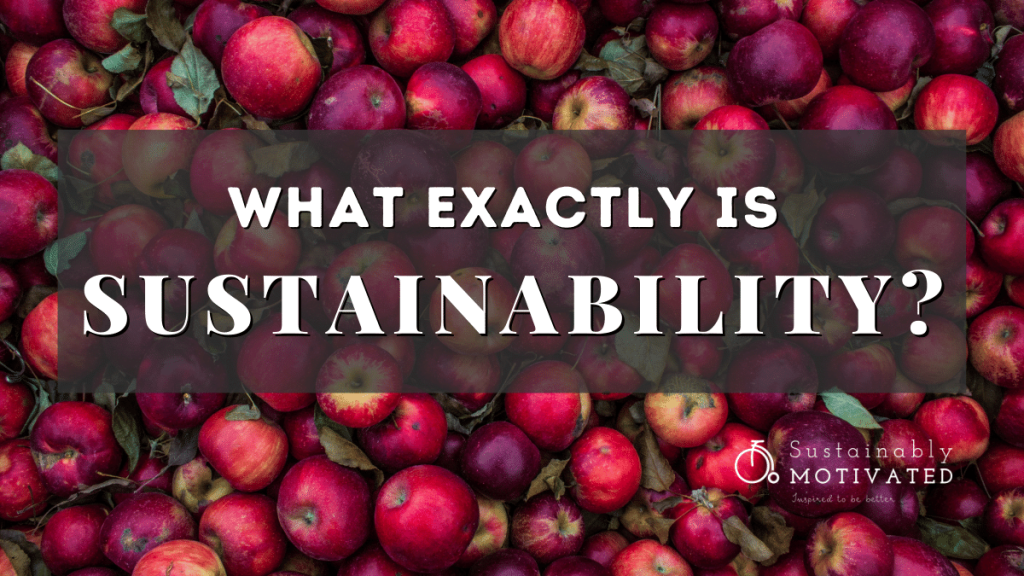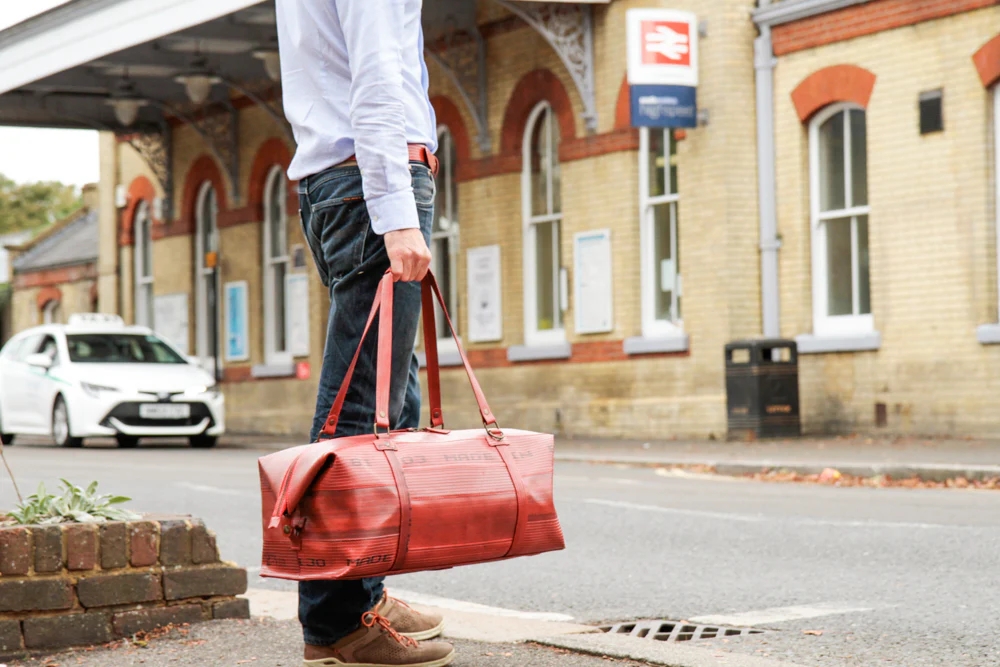
Thinking Ahead
In explicit terms, sustainability has to do with meeting our present needs, without compromising our ability to meet those needs in the future. Essentially, this means taking care of what we have. We need to do this so that we can continue to coexist with an environment that will go on providing us with what we need to survive and thrive in the future.
In other words, we shouldn’t ruin what we have, as our existence depends on it! We need to therefore manage accordingly.

Sustainability Benefits Us All
Acknowledging this is vital! Not necessarily out of a sense of altruism and compassion, but self-preservation. Although compassionate motivations would certainly complement our role as stewards of the earth, the reality is, that preserving the environment helps us ensure our own survival.
Unfortunately, we’re not as considerate of the other creatures that share our natural world. In fact, wildlife populations are disappearing at alarming rates (nearly 70% since 1970!). It’s being called the 6th Mass Extinction, and it’s due to human activity.

Worth Considering
In caring for the natural world – and all the other planetary inhabitants that don’t have a say in our governments – we are in fact also selfishly caring for ourselves. By protecting the earth’s biodiversity and natural life support systems (see Why does it matter?), we are essentially safeguarding our future, and that of our children and grandchildren.
This was powerfully expressed by Swedish teenager & environmental activist Greta Thunberg in her closing remarks at the 2018 United Nations Climate Change Conference (COP24). We can, and must, do better.
Maybe they will ask why you didn’t do anything while there still was time to act. You say you love your children above all else, and yet you are stealing their future in front of their very eyes.” -Greta Thunberg, COP24

Preservation & Conservation
Sustainability requires us to think of the future. It means not exploiting all that we have for contemporary gain. Rather, the notion of sustainability promotes the understanding that we should allow for such resources to remain so that we can continue to enjoy them in the future.
We can (and must) respect the commons. The air, water, and soil that support all life on this planet should certainly be protected and preserved.
Of course humans have needs. But we must learn to revise the magnitude of those needs, so as not to overexploit the environment. It will therefore require adapting (as our ancestors did before us), to better live within nature’s limits.

Agent Smith’s Discovery
Interestingly enough, an observation made by the infamous Agent Smith from The Matrix pretty much hits this nail on the head. As highlighted in the epic Sci-Fi film, humans are the only creatures that take more than they need. Human behaviour has become linked to overconsumption. It’s incredibly destructive, unsatisfying, and is unlike anything in the rest of the natural world.
When surveying other animals, you can witness prey walk, swim, or fly past satisfied predators and not be in danger. Certainly, if said predators are hungry, it’s a different story, but we don’t normally see animals attempting to kill unless they need to feed.
If you haven’t witnessed this phenomenon yourself, there are some great documentaries out there that offer up ample evidence of this natural restraint (check out Planet Earth if you haven’t already).
Human society however has chosen to follow a different path when it comes to resource consumption (see Consumerism). However, that doesn’t mean that we can’t also choose alternative practices that better reflect the natural world (see also Rethinking the Modern Consumption Economy).

It’s Not A Population Issue
Unfortunately, the population argument is made very often in sustainability discussions. This is an unpleasant distraction from the real issues regarding the need for change. The human population is not the culprit.
In fact, the rate of human population is actually decreasing (Pew Research Center). This is especially true here in Japan, where the population is shrinking dramatically. Estimates predict the Japanese population will shrink by as much as a third by mid-century (Japan Times).
Rather, the real issue behind environmental destruction is inequality, greed, and consumption. Reports indicate that the wealthiest 10% of the planet’s inhabitants represent over 50% of carbon emissions (click image above).
Indeed, wealthy countries like the US have carbon emission footprints worth many times over the average global citizen (see Science Alert). In fact, we would need multiple planets to satisfy consumer needs, if all the world’s inhabitants lived like the wealthier nations. We already consume more than the environment can replenish (see World Overshoot Day).
Applying the 4 R’s
There are better ways! We can adopt more sustainable practices. One way of adopting a more balanced approach to consumption is through the application of the 4 Rs. Namely to Refuse, Reduce, Reuse, & Recycle. From the start, if you choose to refuse items you already control the amount of stuff you will have to manage in the future.
This means not opting for everything that is free or complementary. Just because it’s free, or at half-price, doesn’t mean that you need it. Gifts that might have sincere intentions also represent consumption burdens. Try saying, “No thank you.” If you can, share your reason the reason for your refusal. You might just gain support and offer a new perspective for someone else!

An Ecological Buying Hierarchy
Of course, this is easier said than done. There seems to be endless pressure to buy and consume, particularly around birthdays and holidays. When it does come time for gift-giving (relieving), try explaining that you much prefer food items or experiences over material goods.
The same goes for souvenirs. Over the years we accumulate so much stuff, plenty of which we might not even have bought for ourselves. Try and opt out when you can! For more on this I invite you to check out my post on minimalism.

Re-Evaluate Waste
Reducing your individual waste contribution is the next key component. This means using less when you can and cutting down on what you don’t really, really need. Similar to the refusal part, it means evaluating what you need. Perhaps you don’t need the disposable plastic and can do without the straw or throw-away bottle.
Similar to refusing unneeded accessories, is selecting to reduce the amount of waste that you and your family generate. The amount of trash we generate, especially in wealthier countries, is pretty obscene.
One means of accomplishing this is by cutting down on the amount of plastics (see Exploring Alternatives), and reusing what you already own or have access to. Selecting materials that can be washed and reused or repurposed can help alleviate some of the environmental burden.
That’s really the key. Doing more with less. Efficiency and sustainability go hand in hand. Finally, when you can no longer reuse your items, or they can serve no other purpose, you can choose to avoid the landfill and recycle the material.

Feed the Earth
Another means of avoiding the landfill and exercising sustainable behavior is through composting! It allows you to return the nutrients of your discarded food items back to the soil. In addition to reducing landfill waste, it actually assists with the growth of future foods (win-win).
So after you’re done with your plate, your food scraps, coffee grounds, tea bags, eggshells and other leftovers, can all help contribute to a healthy soil. It makes total sense!
For those of you who don’t have access to a garden, increasingly there are compost share programs popping up all over the place (try ShareWaste, CompostNow, or The Compost Exchange). You might not want to start off with a lot, but if and when you do begin composting, you’ll see firsthand how easy it is.
As you take greater notice of all the things you used to trash, you might just begin to reevaluate how much we are demanding of the earth. It’s an enlightening experience.
Protecting Our Blue Dot
This increased awareness and appreciation for our world leads me to my final point on sustainable practices. Namely, the critical need to protect the environment. As well as finding new and innovative ways of reusing waste, maximizing what we do use, and resupplying what we can to the soil, we must work on conservation. Essentially hanging on to what we already have and actively working for the preservation of the Earth’s natural wonders (see Defend Your World).
Preventing further deforestation and erosion is immensely significant in maintaining the world’s delicate balance. We are incredibly fortunate to live on this unique and amazing planet, and we need to ensure it continues to provide habitable conditions for us all.

Ready For Change
This means coming to terms with the sustainability mentality and supporting the complex natural systems that support us. We already have so many indications on how to figure out many of the problems facing humanity. Sustainability offers us the outlook for approaching these challenges and transforming our most destructive tendencies into something better. We can do this!
Thanks for explaining sustainability so well Marc-Antoni. I wish more people would try to live by the 4 R’s. I can understand that for many it can be challenging (myself included), but any kind of effort is better than nothing. As well as cutting down on the amount of things I purchase, I also love composting my kitchen scraps. I then use the compost in my garden – much cheaper than buying soil from my local garden centre.
LikeLike
Amazing!! Same here. Although we actually end up with more scraps than we need for our small patch of green. There are however different services you can coordinate, including this one, https://sharewaste.com Keep up the awesome!! And let us know of any other solid tips you come across.🙏
LikeLike